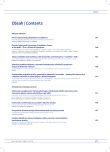Hormonal Contraceptives and Their Relationship to Breast Cancer
Authors:
M. Habánová 1; J. Švikruhová 1; E. Sláviková 2
Authors‘ workplace:
Katedra výživy ľudí, Slovenská poľnohospodárska univerzita v Nitre, Slovenská Republika
1; Medicinske centrum, Nitra, Slovenská Republika
2
Published in:
Klin Onkol 2010; 23(6): 428-432
Category:
Original Articles
Overview
Backgrounds:
The incidence of breast cancer diseases is continuously increasing. Hormonal factors like menarche, menopause and hormone replacement therapy are contributing to breast cancer cases.
Patients and Methods:
Within the retrospective study we monitored one hundred patients between 28 and 79 years old, selected randomly with positive anamnesis of malignant breast cancer. Based on an analysis of their health records, we tried to identify the effect of the risk of hormonal therapy on breast cancer occurrence. The age of patients at which the disease was diagnosed and the length of hormonal treatment were monitored as well.
Results:
Of the one hundred randomly selected patients diagnosed with breast cancer, the majority with positive anamnesis of breast cancer were between 40 and 59 years old. 69 of them have never used any hormonal treatment. The average age of cancer detection in the focused group was 53.38 years old. It was discovered that hormonal contraceptives (HC) and hormone replacement therapy (HRT) decreases the age when breast cancer was first diagnosed. The average age of patients with breast cancer who used HC (n = 16) was 51.80 years old and the average age of patients who used HRT (n = 15) was 51.25 years old.
Conclusion:
Although the age at which patients are diagnosed with breast cancer (being treated with HC and HRT) is lower than the age at which patients were positively diagnosed without using any hormonal treatment, the difference is statistically insignificant.
Key words:
breast neoplasms – contraception – hormone replacement therapy – risk factors
Sources
1. Strnad P, Daneš J. Nemoci prsu pro gynekology. Praha: Grada Publishing 2001 : 324.
2. Bray F, Sankila R, Ferlay J et al. Estimates of cancer incidence and mortality in Europe in 1995. Eur J Canc 2002; 38 : 99 – 165.
3. Valovičová E. Rakovina prsníka – čo o nej vieme? Podpora zdravia 1999; 3 : 2 – 4.
4. Novák J, Palácová M, Foretová L et al. Zhoubná nádorová onemocnení v České Republice 1989 – 2004. Klin Onkol 2008; 21(1): 35 – 36.
5. Giacosa A, Filiberty R. Free radicals, oxidative damage and degenerative diseases. Eur J Cancer Prev 1996; 5(5): 307 – 312.
6. Enger SM, Ross RK, Henderson B et al. Breastfeeding history, pregnancy experience and breast cancer. Br J Cancer 1997; 76(1): 11 – 14.
7. Mishell D. Breast Cancer Risk use of Combined Oral Contraceptives. Contraception 1996; 54(3): 24 – 29.
8. Minarovič I. Riziko rakoviny prsníka pri kombinácii estrogén – progestin vyššie než pri estrogéne samotnom. Lekárnicke listy 2000; 2(5): 21.
9. Casey PM, Cerhan JR, Pruthi S. Oral Contraceptive Use and the Risk of Breast Cancer. Mayo Clin Proc 2008; 83(1): 86 – 91.
10. Kolláriková E. Antikoncepcia a rakovina prsníka. Zdravie 2003; 53(3): 72 – 73.
11. Kuzma I. Rakovina prsníka. 4. vyd. Bratislava: Liga proti rakovine SR 2001.
12. McTaggart L. The cancer handbook – Wat’s really workong. 1. vyd. Philadelphia: JAMA 2002 : 28.
13. Nižňanská Z. Nízkodávková kombinovaná hormonálna antikoncepcia. Gynekológia pre prax 2003; 1(1): 45 – 50.
14. Borovský M, Sojáková M. Hormonálna substitučná liečba a gynekologické nádorové ochoreia. Iatrike Techne 2002; 12(7): 28 – 32.
15. Fait T. Hormonální substituční terapie a riziko karcinomu prsu. Iatrike Techne 2002; 7(2): 38 – 41.
16. McPherson K, Steel CM, Dixon JM. Breast cancer ‑ epidemiology, risk factors and genetics. BMJ 2000; 321(7261): 624 – 628.
17. Sharier C, Gail M, Bryne C et al. Estrogen replacement therapy and breast cancer surrival in a large screening study. J Natl Vancer Inst 1999; 91(3): 264 – 270.
18. Svobodník A, Abrahámová J, Kubala E et al. Predikce rizika vzniku karcinomu prsu u žen v České Republice – metodika sběru dat pro validaci matematického prediktivního modelu. Klin Onkol 2001; 14(4): 135 – 141.
Labels
Paediatric clinical oncology Surgery Clinical oncologyArticle was published in
Clinical Oncology

2010 Issue 6
- Possibilities of Using Metamizole in the Treatment of Acute Primary Headaches
- Metamizole at a Glance and in Practice – Effective Non-Opioid Analgesic for All Ages
- Metamizole vs. Tramadol in Postoperative Analgesia
- Spasmolytic Effect of Metamizole
- Safety and Tolerance of Metamizole in Postoperative Analgesia in Children
-
All articles in this issue
- New Therapeutic Options in Therapy of Glioblastoma Multiforme
- Acute Myeloblastic Leukaemia with Alternationsof MLL Proto-Oncogene Protein (11q23/ MLL+ AML)
- Actual Problems in Structure and Orientation of Concise National Cancer Control Programs
- The Problematic of Original and Generic Drugs and Biosimilars – Switching of Drugs Today and Tomorrow with the Main Targeting on Biotechnologies- Associated Risks
- Evaluation of Neoadjuvant Chemo- Radiotherapy with Locally Advanced Rectal Cancer by Comparing Tumour Volume before and after Treatment
- Hormonal Contraceptives and Their Relationship to Breast Cancer
- Postoperative Accelerated Partial Radiotherapy for Breast Cancer
- Economic Evaluation of Targeted Biologic Therapy in Metastatic Renal Cell Carcinoma
- Malignant Subtype of Cystosarcoma Phyllodes with Brain Metastases
- The Variance of Melphalan Doses Related to Kilogram of Body Weight and the Consequences
- Genetic Testing and Prevention of Hereditary Cancer at the MMCI – Over 10 Years of Experience
- Inflammatory Skin Metastasis as a First Sign of Progression of Lung Cancer – a Case Report
- Clinical Oncology
- Journal archive
- Current issue
- About the journal
Most read in this issue
- New Therapeutic Options in Therapy of Glioblastoma Multiforme
- Hormonal Contraceptives and Their Relationship to Breast Cancer
- Acute Myeloblastic Leukaemia with Alternationsof MLL Proto-Oncogene Protein (11q23/ MLL+ AML)
- Postoperative Accelerated Partial Radiotherapy for Breast Cancer
